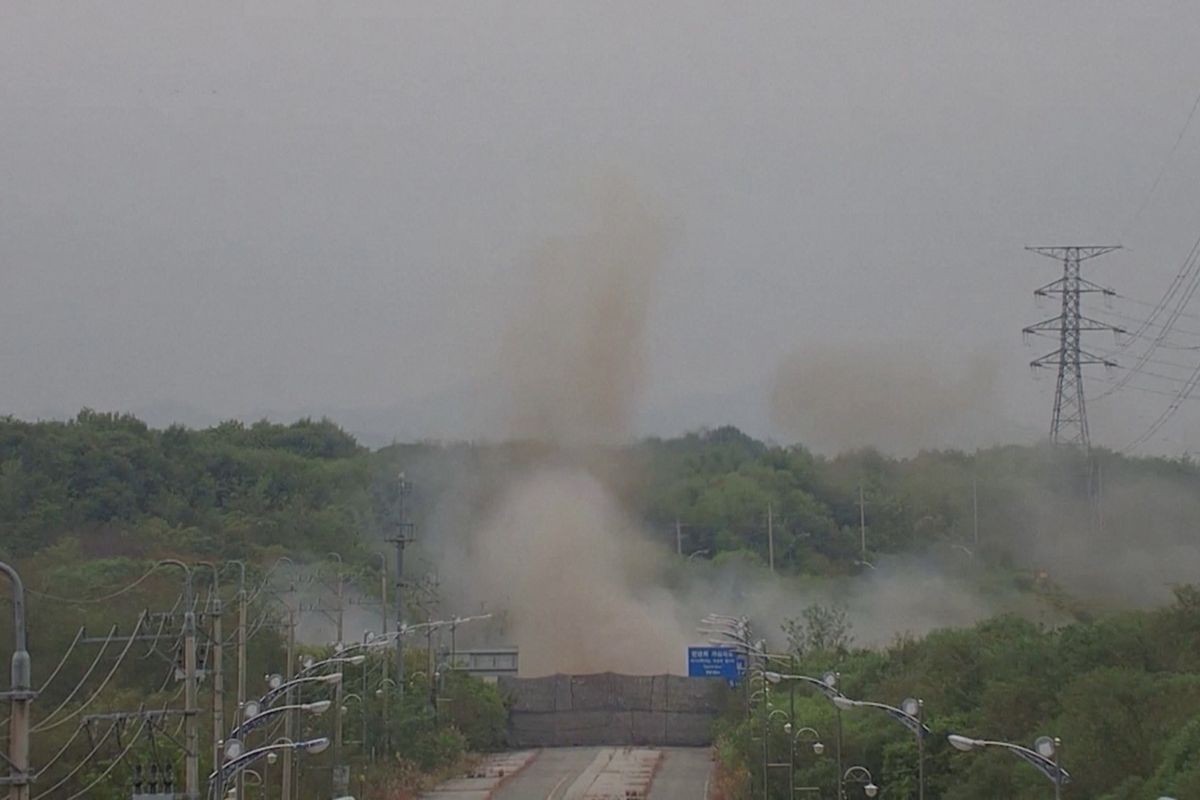North Korea says constitution now defines South as 'hostile' state
Sections of key inter-Korean roads and railways 'completely blocked through blasting', according to North Korea.
AFP
News Agency Partner
AFP is a renowned international news agency, delivering comprehensive and reliable reporting on global events, trends, and issues.

Smoke rises after North Korea blows up sections of inter-Korean roads on its side of the border between the two Koreas, according to South Korea's military, as seen from the South Korean side, October 15, 2024, in this screen grab from a handout video.
Reuters
Ties between North and South defined as "special relationship", not state-to-state, under 1991 inter-Korean accord
North Korean ally China urges 'political settlement process'
Relations between the two Koreas have deteriorated since Kim in January defined Seoul as his country's "principal enemy" and said the North was no longer interested in reunification.
After months of laying fresh mines and ramping up security on the border, the country this week blew up roads and railways linking it to the South, calling it "an inevitable and legitimate measure", the official Korean Central News Agency said.
The move was "taken in keeping with the requirement of the DPRK Constitution, which clearly defines the ROK (South Korea) as a hostile state," KCNA said, the first time the North has mentioned a revision of its basic law.
The country last week held a key meeting of its rubber-stamp parliament, where experts had widely expected the constitution to be revised after Kim's explicit call for it in January.
Under a 1991 inter-Korean accord, relations between the North and South had been defined as a "special relationship" rather than state-to-state relations, part of a process aimed at eventual reunification.
South Korea's military on Tuesday released video footage of North Korean soldiers dynamiting deeply symbolic roads and railways connecting the two Koreas, days after Pyongyang's military had vowed to "permanently" seal the border with the South.
North Korea said that sections of the key inter-Korean roads and railways had "been completely blocked through blasting".
The detonations may have been done for domestic propaganda reasons, experts have said, with some pointing out that Pyongyang appeared to have used South Korean military images in its media coverage of the event.
Pyongyang's major ally China on Thursday urged a "political settlement process to the peninsula issue" spokeswoman Mao Ning said.
Beijing is North Korea's main diplomatic ally and economic backer, and also a major trade partner of the South.
Solidifying hostilities
"The ongoing commitment to fortifying the southern border seems to reflect an intention to permanently solidify hostilities with the enemy state," Yang Moo-jin, president of the University of North Korean Studies in Seoul, told AFP.
Near the inter-Korean border in Paju, South Korean small business owner You Dong-woo, 76, told AFP he initially thought North Korea's road explosions were "just a show".
"After thinking about it more and seeing them blowing up roads and railroads, I became concerned," he said.
"At our age, we don't have much to worry about. But if something like a war breaks out, our children will be the first to come to my mind."
Construction worker Moon Byung-soo told AFP he was concerned about the risk of a major escalation, as the North was "talking bluntly about using nuclear weapons on South Korea".
North Korea also recently accused Seoul of using drones to drop anti-regime propaganda leaflets on the capital Pyongyang, with Kim convening a security meeting to direct a plan of "immediate military action" in response, state media reported Tuesday.
Seoul's military initially denied sending drones north but has subsequently declined to comment, even as Pyongyang has warned it would consider it "a declaration of war" if another drone was detected.
Activist groups in the South have long sent propaganda northwards, typically carried by balloons, but some have also flown small, hard-to-detect drones into the North.
North Korea has been bombarding the South with trash-carrying balloons since May, in retaliation for the activists' propaganda missives.
Pyongyang earlier this week said it had "clear evidence" that Seoul's military was behind the recent drone incursions.
JCS spokesperson Lee Sung-joon told reporters on Thursday the claim was "something North Korea should verify".
North Korea has itself sent drones southwards -- in 2022, five of Pyongyang's drones crossed the border, prompting the South Korean military to fire warning shots and deploy fighter jets.
The jets failed to shoot down any of the drones.










Comments
See what people are discussing